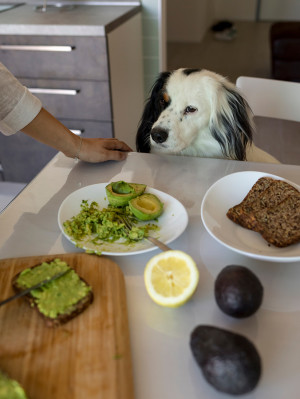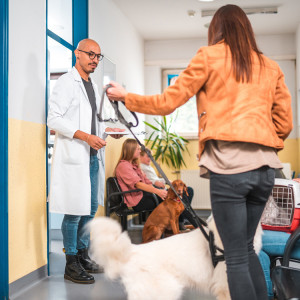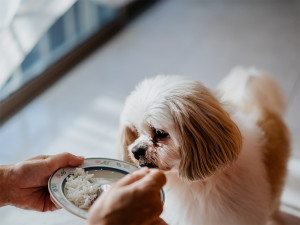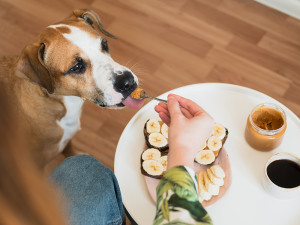
Share Article
In This Article:
Can Dogs Eat Grapes? Symptoms of Grape Toxicity What To Do if Your Dog Eats Grapes or Raisins Snack Alternatives to Grapes
They’re sweet, poppable, and have a crunch we crave. Even their wrinkly counterparts are addictive, but the fact is that grapes and raisins have no place in your dog’s diet. Grapes, raisins, and the variety of things created with them are considered toxic to dogs, with even small amounts potentially causing kidney failure. Here we’ll discuss the whys and offer you suggestions for safer sweet doggie treats.
Can dogs eat grapes?
Although grapes are a convenient snack with numerous possible health benefits for humans, they should never be fed to dogs. This may be surprising to some dog parents who have given their dogs grapes for years without any obvious issues developing. This unpredictability has troubled toxicologists for years, making it difficult for them to figure out why grapes are harming dogs.

Why can’t dogs have grapes?
Researchers recently discovered that tartaric acidopens in new tab is the likely culprit that causes grapes to be toxic. Grapes naturally contain more tartaric acid than most fruits, though the amount of it present varies widely between the type of grape and the ripeness of it.
Can dogs have grapes or raisins in any amount?
This wide variation in the amount of the toxin partially explains why some dogs get sick when eating relatively few grapes, while others do not develop any issues. It is also suspected that some dogs are more sensitive to tartaric acid than others, though this hasn’t been proven definitively. Because there’s so much variability in the toxin profile, vets consider any ingestion of grapes and raisins by a dog as dangerous.
Symptoms of grape toxicity
Without question, grapes are toxic to dogs, and the ingestion of even just a few grapes can cause kidney failure. Watch out for these early signs of grape toxicityopens in new tab:
Lethargy
Left untreated, the toxicity can progress and cause kidney damageopens in new tab with signs that include:
Increase in urine production
Increase in water consumption
Mouth ulcers
Bad breath
Grapes can also cause neurological changes in dogs, making them weak or unsteady on their feet. Fortunately, these neurological symptoms are often temporary and should not persist long-term. Damage to the kidneys may or may not be permanent, depending on how quickly the problem is recognized and the dog’s response to treatment.
What should you do if your dog eats grapes or raisins?
If your dog gobbles some grapes or raisins, don’t waste any time contacting a vet. The best treatment is the one that starts early, so seek veterinary care as soon as possible. Veterinarians will usually give dogs medication to make them vomit, even if the grapes were eaten many hours previously.
The treatment for grape toxicity focuses on protecting the kidneys from the harmful effects of the toxin. This involves diuresis, in which dogs are administered more fluids than they need so that there is a constant flow of urine through the kidneys. Proper diuresis requires a hospital stay and the monitoring of kidney values to make sure the treatment is effective. Depending on the number of grapes ingested — plus the dog’s size and medical history — other treatment options may also be presented.
Alternative snacks to give your dog besides grapes
Grapes and raisins are a definite “no” for dogs, but there are plenty of other healthy and safe treat options. These include:
Apples
Bananas
Berries
Melons
Cucumber
Carrots
Peas
Sweet potatoes
Bell peppers
And many more. Thoroughly wash any safe fruit or vegetable, remove the seeds/pit, and feed in moderation. Speak to your veterinarian before adding any human foods to your dog’s diet to make sure they are safe and healthy.
Bottom line
Grapes and raisins have no place in your dog’s diet. Even small amounts can be toxic, potentially causing irreversible kidney damage.
If your dog happens to grab some grapes, contact your veterinarian immediately.
Looking for a safe and healthy treat? There are plenty of human foods that can work, just be sure to consult your veterinarian first.

Dr. Chyrle Bonk, DVM
Dr. Chyrle Bonk has been a mixed-animal veterinarian since 2010, with a special interest in rehabilitation. When she's not practicing or writing about veterinary medicine, you may find her exploring the outdoors with her family or tending to her cows, horses, chickens, or cats and dogs.

Dr. Bartley Harrison, DVM
Dr. Bartley Harrison is a veterinarian with more than 19 years of experience. He has treated a variety of species in emergency and speciality practices for both large and small animals. His primary interests as a vet are emergency medicine and critical care.
Related articles
![Pet owner feeding white rice to her Shih Tzu dog.]()
Can Dogs Eat Rice? And More Importantly, Should They?
Yes, actually. Just follow these guidelines.
![Golden retriever looks at some eggs on the counter]()
Can Dogs Eat Eggs?
Yes, eggs are a nutritious treat for dogs.
Can My Dog Eat Honey? Learn If Honey Is Beneficial or Harmful For Dogs
They shouldn’t exactly have their paw constantly in the honey jar, but the sweet stuff can be beneficial in some cases.
Can Dogs Eat Avocado?
Hold the avo toast, please.
![View over the shoulder of a women eating peanut butter and bananas and feeding some of the peanut butter to her dog on a spoon]()
Can Dogs Eat Peanut Butter?
Elvis famously loved peanut butter. So, can your “Hound dog” lap it up, too?
Can Dogs Eat Strawberries?
In moderation, strawberries are a tasty, healthy treat for your pup.










